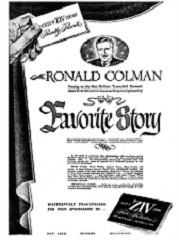
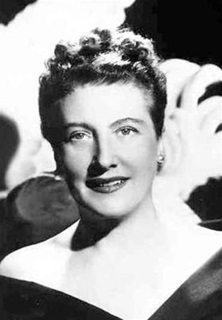 Favorite Story (1946-49) aired “The Man Who Married a Dumb Wife” on January 22, 1949. The idea behind this popular show was to invite personalities of the time—authors, musicians, movie stars, sports celebrities, and others with a high profile–-to offer their favorite stories to be dramatized on radio. We’ve run a dozen to date, the last one coming in January of 2022, almost three years ago. Thus, for newcomers to the program or to refresh the memories of those familiar with the show, a few notes on the show are in order.
Favorite Story (1946-49) aired “The Man Who Married a Dumb Wife” on January 22, 1949. The idea behind this popular show was to invite personalities of the time—authors, musicians, movie stars, sports celebrities, and others with a high profile–-to offer their favorite stories to be dramatized on radio. We’ve run a dozen to date, the last one coming in January of 2022, almost three years ago. Thus, for newcomers to the program or to refresh the memories of those familiar with the show, a few notes on the show are in order.
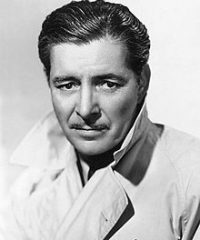
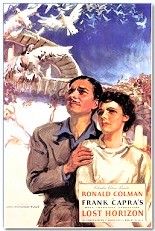 Favorite Story was hosted by the suave, debonair, early film star Ronald Colman (1891-1958), who on occasion would star in these well-produced adaptations of classic stories. Of interest to genre fans is Colman’s starring role in the 1937 film adaptation of James Hilton’s 1933 novel Lost Horizon. He was signed to play the lead in MGM’s forthcoming SF film Village of the Damned (1960), but died before production began. The film was picked up by a British company and starred George Sanders in the lead role. (Coincidentally, Sanders would marry Colman’s widow, Benita Hume.) Colman was nominated for three Best Actor Oscars and would win the Oscar for 1947’s A Double Life. He was honored with not one, but two stars on the Hollywood Walk of Fame, one for motion pictures and one for television. Directed by beloved film director Frank Capra, Lost Horizon co-starred a young Jane Wyatt (1910-2006) who would later be fondly remembered as Margaret Anderson as the wife of insurance salesman Jim Anderson (portrayed by Robert Young) in TV’s favorite family sitcom Father Knows Best (1954-1960). For her role as America’s favorite mother she would win consecutive Emmy Awards for Best Actress in a Comedy Series in 1958, 1959, and 1960. Wyatt would also have roles in a few dozen films over her career, probably the most notable being 1947’s Gentleman’s Agreement starring Gregory Peck, Dorothy McGuire, John Garfield, Celeste Holm, and Dean Stockwell. Appearing in numerous television shows from the 1950s to the 1980s, she is perhaps best remembered by science fiction fans as Spock’s mother in the original Star Trek TV series episode “Journey to Babel.”
Favorite Story was hosted by the suave, debonair, early film star Ronald Colman (1891-1958), who on occasion would star in these well-produced adaptations of classic stories. Of interest to genre fans is Colman’s starring role in the 1937 film adaptation of James Hilton’s 1933 novel Lost Horizon. He was signed to play the lead in MGM’s forthcoming SF film Village of the Damned (1960), but died before production began. The film was picked up by a British company and starred George Sanders in the lead role. (Coincidentally, Sanders would marry Colman’s widow, Benita Hume.) Colman was nominated for three Best Actor Oscars and would win the Oscar for 1947’s A Double Life. He was honored with not one, but two stars on the Hollywood Walk of Fame, one for motion pictures and one for television. Directed by beloved film director Frank Capra, Lost Horizon co-starred a young Jane Wyatt (1910-2006) who would later be fondly remembered as Margaret Anderson as the wife of insurance salesman Jim Anderson (portrayed by Robert Young) in TV’s favorite family sitcom Father Knows Best (1954-1960). For her role as America’s favorite mother she would win consecutive Emmy Awards for Best Actress in a Comedy Series in 1958, 1959, and 1960. Wyatt would also have roles in a few dozen films over her career, probably the most notable being 1947’s Gentleman’s Agreement starring Gregory Peck, Dorothy McGuire, John Garfield, Celeste Holm, and Dean Stockwell. Appearing in numerous television shows from the 1950s to the 1980s, she is perhaps best remembered by science fiction fans as Spock’s mother in the original Star Trek TV series episode “Journey to Babel.”
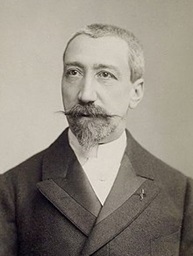 “The Man Who Married a Dumb Wife” was written by French poet, journalist, and novelist Anatole France (1849-1924, photo at right) and was selected by internationally famous soprano opera star Helen Traubel (1899-1972, photo top right). The story can be read as a humorous one-off take on certain superficial perceptions the sexes have of each other—at least today—and how they are turned into what is known by comics as observational humor. You know, the observation (accurately or not) by women that men hate to ask for directions while driving, or that (accurately or not) men opine that women like to yak-yak-yak all the time about trivial, mundane matters and men seem never to pay attention to anything they say. There are a host of others but you get the idea. “The Man Who Married a Dumb Wife” resonates on this level effectively, but also on a much more important level, stemming from when it was written and the context within which the humor was aimed. The novella, published in 1915, is sharp commentary on the fact that, at that time, the French patriarchy looked down on women as second class citizens who were better seen and not heard. Thus was the seed for this satire sown, waiting only for one witty and enlightened soul such as the author to puncture this pretension with humor. And the irony is brought home more than once in this artfully crafted little jab to the male ego, such that its message can be appreciated and chuckled openly over a century later. What this says in a larger sense about the relationship between the sexes is yet to be determined with any sort of finality, except maybe to offer, in this particular case and as advice to either sex, to beware what you wish for. I had never run across this story until I was fortunate enough to hear this fine radio adaptation, so was delightfully surprised more than once before coming to the perfectly executed finish. Kudos to the author and to Helen Traubel (a woman, we note, who was not shy about using her voice) for suggesting this one as her favorite story. I think you’ll like this one.
“The Man Who Married a Dumb Wife” was written by French poet, journalist, and novelist Anatole France (1849-1924, photo at right) and was selected by internationally famous soprano opera star Helen Traubel (1899-1972, photo top right). The story can be read as a humorous one-off take on certain superficial perceptions the sexes have of each other—at least today—and how they are turned into what is known by comics as observational humor. You know, the observation (accurately or not) by women that men hate to ask for directions while driving, or that (accurately or not) men opine that women like to yak-yak-yak all the time about trivial, mundane matters and men seem never to pay attention to anything they say. There are a host of others but you get the idea. “The Man Who Married a Dumb Wife” resonates on this level effectively, but also on a much more important level, stemming from when it was written and the context within which the humor was aimed. The novella, published in 1915, is sharp commentary on the fact that, at that time, the French patriarchy looked down on women as second class citizens who were better seen and not heard. Thus was the seed for this satire sown, waiting only for one witty and enlightened soul such as the author to puncture this pretension with humor. And the irony is brought home more than once in this artfully crafted little jab to the male ego, such that its message can be appreciated and chuckled openly over a century later. What this says in a larger sense about the relationship between the sexes is yet to be determined with any sort of finality, except maybe to offer, in this particular case and as advice to either sex, to beware what you wish for. I had never run across this story until I was fortunate enough to hear this fine radio adaptation, so was delightfully surprised more than once before coming to the perfectly executed finish. Kudos to the author and to Helen Traubel (a woman, we note, who was not shy about using her voice) for suggesting this one as her favorite story. I think you’ll like this one.
Play Time: 27:36
{This episode aired on a Saturday evening in late January of 1949, and while the neighborhood gang wasn’t quite old enough to appreciate the full measure of the humor, geared more toward an adult audience as it was, they nevertheless found themselves laughing at several ironic twists thrust upon at least one of the characters. So the next morning after church, like they did most Sunday’s, they changed clothes and headed for the nearby newsstand after lunch, in the mood for stories far from the humor they admittedly enjoyed the night before. Street & Smith’s Detective Story (1915-1953) was the first pulp magazine devoted exclusively to detective fiction. For its first 17 years through most of 1932 it published a new issue every week. It then scaled down to a more reasonable schedule as a bi-weekly from late 1932 through late 1935 when it cut back even further to a mere monthly, a schedule it maintained through most of 1948. It managed but three quarterly issues in 1949 before going on a two-year hiatus until it returned with a single issue in 1952. It ended its marvelous run as a bi-monthly with 5 issues in 1953. Detective Tales (1935-1953) was highly successful with its singular detective magazine format and ran for 18 years and 202 issues, all but its final three years as a monthly. New Detective ( 1941-1955) promised its readers the newest in crime fiction, with well-written tales featuring for the most part police detectives. As a bi-monthly it managed a respectable 73 issues before merging with Detective Tales in 1953 to form Fifteen Detective Stories. Unfortunately, this merger lasted but 15 issues when it eschewed any semblance to a detective pulp and became a men’s magazine (True Adventures) that ran no fiction of any kind.}
[Left: Detective Story, Winter/49 – Center: Detective Tales, 1/49 – Right: New Detective, 1/49]
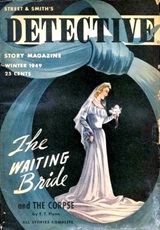
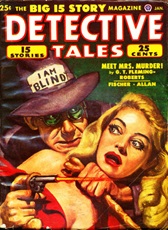
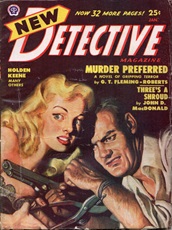
To view the entire list of weekly Old Time Radio episodes at Tangent Online, click here.